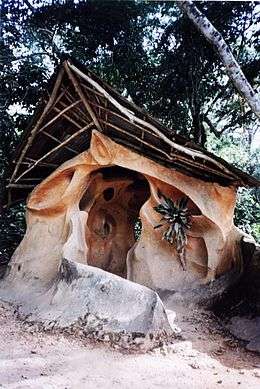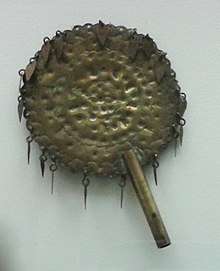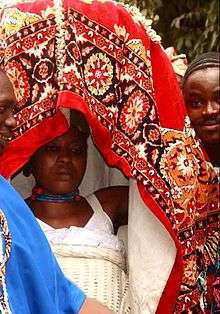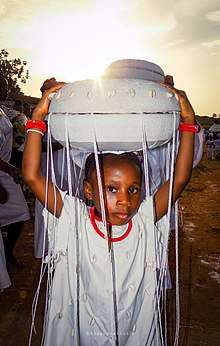Oshun
Ọṣun, is an Orisha, a spirit, a deity, or a goddess that reflects one of the manifestations of the Yorùbá Supreme Being in the Ifá oral literature and Yoruba-based religions. She is one of the most popular and venerated Orishas. Osun is an important river deity among the Yorùbá people. She is the goddess of divinity, femininity, fertility, beauty and love.[1][2] She is connected to destiny and divination.[3]
| Ọṣun Oshun | |
|---|---|
Love, Beauty, Intimacy, Freshwater, Osun River, Wealth, Diplomacy | |
| Member of the Orisha | |
 | |
| Other names | Ochún, Oxúm |
| Venerated in | Yoruba religion, Dahomey mythology, Vodun, Santería, Candomblé, Haitian Vodou |
| Region | Nigeria, Benin, Latin America, Haiti, Cuba |
| Ethnic group | Yoruba people, Fon people |
| Personal information | |
| Spouse | Changó, Erinle |


During the life of the mortal Osun, she served as queen consort to King Shango of Oyo. Following her posthumous deification, she was admitted to the Yoruba pantheon as an aspect of a primordial divinity of the same name.
She is the patron saint of the Osun River in Nigeria, which bears her name. The river has its source in Ekiti State, in the west of Nigeria, and passes through the city of Osogbo, where Osun-Osogbo Sacred Grove, the principal sanctuary of the deity, is located.[1] Osun is honored at the Osun-Osogbo Festival, a two-week-long annual festival that usually takes place in August, at the Osun-Osogbo Sacred Grove on the banks of the river.[4][5]
Osun is one of the 401 Yoruba gods.
Ceremonies and Ritual Colors
Osun is the orisha of the river. Her devotees leave her offerings and perform ceremonies at bodies of fresh water such as rivers, streams and canals.
She is associated with the colours White.
Abẹ̀bẹ̀
The Abẹ̀bẹ̀ is the ritual object most associated with Ọṣun. The Abẹ̀bẹ̀ is a fan in circular form.
Brazil
Ọṣun is a female orishá adopted and worshiped in all Afro-Brazilian religions. She is the orishá of the fresh water of rivers and waterfalls; of wealth and prosperity; of love; and of beauty. Followers seek help for romantic problems from Osun; the orisha is also responsible for marriage and other relationships. As the orishá of financial life, she is also called the "Lady of Gold". This referred to copper at one time for being the most valuable metal of the time. Osun is worshiped at rivers and waterfalls, and more rarely, near mineral water sources. She is a symbol of sensitivity and is identified by weeping.[5]
Candomblé
In Candomblé Bantu Osun called Nkisi Ndandalunda, the Lady of Fertility and Moon. Hongolo and Kisimbi have similarities with Osun, and the three are often confused.
In Candomblé Ketu Osun is the deity of fresh water; the patron of gestation and fecundity; and receives the prayers of women who wish to have children and protect them during pregnancy. Osun also protects small children until they begin to speak; she is affectionately called "Mamãe" ("Mama") by her devotees.[5]
Plants associated with Osun in Brazil are aromatic, sweet, an often yellow, reflecting the qualities of the Orisha. They include mints (Lamiacaea). Osun is associated with the folha-de-dez-réis (Hydrocotyle cybelleta), a plant of the pennywort family. Many species are brilliant yellow, reflecting Osun's association with gold and wealth. She is also associated with folha-da-fortuna, or Kalanchoe pinnata.[8]
Santeria

Osun (Ozun) is another major Orisha distinct from Osun in the Santería religion of the Caribbean (Cuba and Trinidad) brought over by Yoruba slaves during the transatlantic slave trade. Traditionally, Osun is an agent of the other Orishas protecting the orí (head) of Santería practitioners. She is syncretized with Saint John the Baptist.[9]
Violín for Osun

A violín is a type of musical ceremony in Regla de Ocha performed for Osún. It includes both European classical music and Cuban popular music.[10]
References
- Murrell, Nathaniel Samuel (2009). Afro-Caribbean Religions: An Introduction to Their Historical, Cultural, and Sacred Traditions. Temple University Press. ISBN 9781439901755.
- Coleman, Monica A. (2006). "African American Religion and Gender". In Pinn, Anthony B. (ed.). African American Religious Cultures. p. 501. ISBN 9781576074701.
- Monaghan, Monaghan (2014). Encyclopedia of Goddesses and Heroines. New World Library. p. 15. ISBN 9781608682188.
- Martine, Ife. "A Yoruba Festival Tradition Continues: 50 Incredible Photos Celebrating The River Goddess Oshun". OkayAfrica.com. Retrieved 21 June 2016.
- Lopes, Nei (2004). Enciclopédia brasileira da diáspora africana. São Paulo, SP: Selo Negro Edições. p. 505. ISBN 8587478214.
- Kumari, Ayele (2013). Iyanifa: Women of Wisdom. uSA: maat Group. p. 40. ISBN 978-1500492892.
- Matory, J. Lorand (2005). Sex and the Empire That Is No More: Gender and the Politics of Metaphor in Oyo Yoruba Religion. Berghahn Books. ISBN 9781571813077. Retrieved 21 June 2016.
- Alexiades, Miguel (2009). Mobility and migration in indigenous Amazonia : contemporary ethnoecological perspectives. New York: Berghahn Books. ISBN 9781845455637.
- Olupọna, Jacob O. K, and Terry Rey. Òrìşà Devotion As World Religion: The Globalization of Yorùbá Religious Culture. Madison, Wis: University of Wisconsin Press, 2008. Print, pg.395.
- A VIOLIN FOR OCHÚN-WITH REGGAETON! By Johnny Frías. Cuba Counterpoints, Nov 2016
Further reading
- Ajiabde, G. Olusola. Negotiating Performance: Osun in the Verbal and Visual Metaphors, Bayreuth, Working Papers, 2005.
- Afolabi, Kayode. Osun Osogbo - Sacred People and Sacred Places, Charleston 2006.
- Badejo, Diedre, Oshun Seegesi: The Elegant Deity of Wealth, Power, and Femininity, Asmara 1996.
- De La Torre, Miguel A., "Dancing with Ochún: Imagining How a Black Goddess Became White," in Black Religion and Aesthetics: Religious Thought and Life in Africa and the African Diaspora, Anthony Pinn, ed., Cambridge University Press, pp. 113–134.
- Fakayode, Fayemi Fatunde, Osun: The Manly Woman, Athelia Henrietta Press 2004.
- Murphy, Joseph M.; Sanford, Mei-Mei. Osun Across the Waters: A Yoruba Goddess in African and the Americas. Bloomington: Indiana University Press, 2001.
- Probst, Peter, Osogbo and the Art of Heritage : Monuments, Deities, and Money. Bloomington: Indiana University Press, 2011.
- Popoola, S. Solagbade, Ikunle Abiyamo: It is on Bent Knees that I gave Birth. Asefin Media Publication, 2007
- Akalatunde, Osunyemi, Ona Agbani: The Ancient Path: Understanding And Implementing The Ways Of Our Ancestors . Createspace, 2005
- Oshun The Poet, "Flow Like Oshun: Book of Haikus". Createspace, 2018
External links
- Santeria.fr All about Oshun
 Another picture of an Arugba at the Osun-Osogbo festival
Another picture of an Arugba at the Osun-Osogbo festival